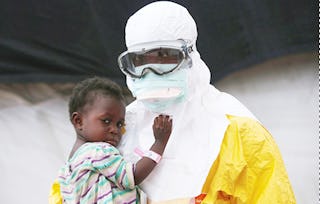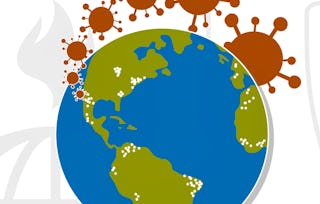Learn about the evolving Ebola epidemic and its various aspects including disease prevention, management and treatment, response to the epidemic, ethical considerations, and the post-Ebola global health landscape.

Ebola Virus Disease: An Evolving Epidemic

Ebola Virus Disease: An Evolving Epidemic


Instructors: Dabney P. Evans, PhD, MPH
10,260 already enrolled
Included with
222 reviews
Skills you'll gain
Details to know

Add to your LinkedIn profile
5 assignments
See how employees at top companies are mastering in-demand skills

There are 6 modules in this course
Upon completion of this module, learners will be able to: Review the state of global public health prior to the 2014 Ebola epidemic. Explore the etiology of Ebola and other viral hematic fevers. Explain the epidemiology of the 2014 Ebola epidemic and why this outbreak is different than previous ones. Explain why tropical forest-associated zoonotic pathogens like Ebola are emerging at an ever-increasing rate. Recognize drivers of disease spillover from wildlife to people and discuss how to mitigate disease spillover.
What's included
7 videos4 readings1 assignment
Upon completion of this module, learners will be able to: Identify the clinical features of Ebola Virus Disease (EVD). Discuss risk assessment as it relates to the selection of personal protective equipment (PPE). Explain the differences between donning and doffing. Recognize the lessons learned from providing care to Ebola patients in the United States.
What's included
5 videos2 readings1 assignment
Upon completion of this module, learners will be able to: List the different types of therapeutics for Ebola Virus Disease. Recognize the factors critical to the creation of a successful Ebola vaccine. Define plasma and recognize its importance in the Ebola treatment process. Discuss the response of various international actors to the Ebola epidemic. Recognize the role of communications both in terms of community level in West Africa, as well as at Emory University.
What's included
8 videos2 readings1 assignment
Upon completion of this module, learners will be able to: Discuss clinical laboratory considerations for Ebola Virus Disease.Differentiate between persons under investigation and persons with confirmed EVD. Identify where and how EVD laboratory testing is performed. Recognize the safety concerns surrounding the disposal of specimens and human remains. Explore the immune response to EVD and discuss the implications for future therapeutics and vaccines.
What's included
5 videos2 readings1 assignment
Upon completion of this module, learners will be able to: Describe the typical presentation and differential diagnosis of patients with suspect EVD. Describe the approach and necessary precautions for evaluating a patient with suspect EVD. Identify the necessary precautions for transportation of a patient with EVD. Define quarantine and analyze quarantine polices.Recognize the ways in which public health program choices, such as isolation and quarantine, require consideration of ethical, human rights, and legal principles.
What's included
7 videos2 readings1 assignment
Upon completion of this module, learners will be able to: Describe the importance of health systems as they relate to the Ebola epidemic. Define and list characteristics of resilient health systems. Consider how the Ebola epidemic has changed global health.
What's included
5 videos3 readings
Instructors


Offered by
Explore more from Public Health
 Status: Free
Status: FreeUniversity of Amsterdam
 Status: Preview
Status: PreviewThe University of Hong Kong
 Status: Free Trial
Status: Free TrialJohns Hopkins University
 Status: Free Trial
Status: Free TrialImperial College London
Why people choose Coursera for their career

Felipe M.

Jennifer J.

Larry W.

Chaitanya A.
Learner reviews
- 5 stars
76.57%
- 4 stars
18.91%
- 3 stars
2.70%
- 2 stars
0.45%
- 1 star
1.35%
Showing 3 of 222
Reviewed on Feb 8, 2020
This is a great course, with all aspects of public health, how it differs from individual health, and very relevant to watch now with the coronavirus outbreak, thanks!
Reviewed on Oct 6, 2015
I loved every unit. The lecturers were amazingly clear and I understood the content. Great work.
Reviewed on Mar 19, 2018
A great resource for anyone looking to explore the etiology of ebola.

Open new doors with Coursera Plus
Unlimited access to 10,000+ world-class courses, hands-on projects, and job-ready certificate programs - all included in your subscription
Advance your career with an online degree
Earn a degree from world-class universities - 100% online
Join over 3,400 global companies that choose Coursera for Business
Upskill your employees to excel in the digital economy
Frequently asked questions
To access the course materials, assignments and to earn a Certificate, you will need to purchase the Certificate experience when you enroll in a course. You can try a Free Trial instead, or apply for Financial Aid. The course may offer 'Full Course, No Certificate' instead. This option lets you see all course materials, submit required assessments, and get a final grade. This also means that you will not be able to purchase a Certificate experience.
When you purchase a Certificate you get access to all course materials, including graded assignments. Upon completing the course, your electronic Certificate will be added to your Accomplishments page - from there, you can print your Certificate or add it to your LinkedIn profile.
Yes. In select learning programs, you can apply for financial aid or a scholarship if you can’t afford the enrollment fee. If fin aid or scholarship is available for your learning program selection, you’ll find a link to apply on the description page.
More questions
Financial aid available,

